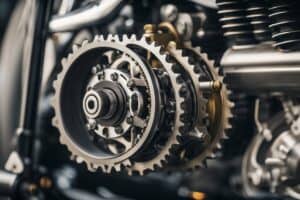Feeling the pinch at the pump with your motorcycle guzzling more gas than it should?
You’re not alone.
Excessive fuel consumption is a common headache for riders, but don’t worry, there’s a fix.
Understanding the root cause is crucial, and that’s where you’ll start.
From spark plugs to air filters, several culprits could be behind your bike’s thirst for fuel.
Let’s rev up and troubleshoot your way to a more fuel-efficient ride.
With the right knowledge, you’ll not only save on fuel costs but also improve your motorcycle’s performance.
Ready to get more miles out of each gallon?
Stay tuned to learn how to curb that fuel consumption and keep your ride smooth and efficient.
Understanding Excessive Fuel Consumption
Excessive fuel consumption in motorcycles can be perplexing.
It often indicates that your engine isn’t running as efficiently as it should.
Think of your motorcycle’s fuel system as the vehicle’s lifeline — it needs to be in top shape for optimal performance.
Key factors contributing to high fuel usage include:
- Improper tire pressure
- Excessive idling
- Rich fuel mixture
- Poor riding habits
- Faulty spark plugs or air filters
Check your bike’s tire pressure regularly.
Even a small deviation from the recommended levels can cause a significant increase in fuel consumption.
Tires that aren’t inflated properly create more resistance when rolling, demanding extra effort from your engine.
Idle less. Every minute spent idling consumes fuel that’s not being used for travel.
When you’re stopped for more than a minute, switch off the engine to prevent unnecessary fuel use.
A rich fuel mixture — too much fuel in comparison to air — can also guzzle gas.
It’s not just about wasting fuel; it’s about the health of your bike.
Ensure your motorcycle’s air-to-fuel ratio is correct.
Adjusting the carburetor or checking the fuel injection system can often correct this imbalance.
Your riding habits can contribute greatly to fuel use.
Aggressive acceleration and frequent high-speed runs will burn through fuel faster.
Practice smooth throttle control and plan your rides to maintain steady speeds.
Be sure to inspect and replace spark plugs and air filters as needed.
Worn spark plugs or dirty air filters make your engine work harder, using more fuel in the process.
Regular maintenance can lead to substantial improvements in fuel efficiency.
Monitoring these areas will help you identify where improvements can be made.
Remember, even the smallest changes can lead to noticeable savings in fuel consumption over time.
Common Culprits of Excessive Fuel Consumption

Motorcycle engines are sophisticated machines, and there’s a range of factors that could lead to excessive fuel consumption.
Recognizing these common culprits is your first step toward fixing the issue.
Incorrect Engine Oil Viscosity can lead to higher friction losses within the engine.
Make sure you’re using the oil grade specified by your motorcycle’s manufacturer.
Dragging Brakes are another undercover agent of excess fuel usage.
If the brake calipers stick, they can cause a slight but continuous drag on the wheel, decreasing fuel efficiency.
A Worn Out Clutch might be responsible for slippage and inefficient power transfer from the engine to the wheels, causing your motorcycle to work harder and use more fuel in the process.
The Oxygen Sensor or O2 Sensor, which monitors the oxygen levels in the exhaust, can send incorrect data to the engine’s computer if it’s faulty.
This can alter the fuel mixture, leading to richer or leaner combustion than necessary.
Lastly, don’t ignore the effect of External Factors such as riding against strong winds or carrying extra weight.
Both can increase fuel consumption significantly, as your motorcycle exerts more energy to overcome these obstacles.
By investigating these potential issues, you should be able to identify and rectify the cause of your motorcycle’s thirst for fuel.
Regular checks and timely maintenance are your best defense against these problems, ensuring your bike always runs at peak efficiency.
Checking the Spark Plugs

When you notice your motorcycle guzzling more fuel than usual, spark plugs can be critical culprits.
These small components are responsible for igniting the air-fuel mixture in your engine.
Over time, they can become fouled or wear out, hindering efficient combustion.
It’s essential to check them regularly.
To inspect your spark plugs, you’ll need to remove them and look for any signs of wear or buildup.
A healthy spark plug should have a light tan or grayish insulator and clean electrodes.
If you see dark deposits or the electrode is eroded, it’s time for a replacement.
Keep in mind, using the wrong type of spark plug can also affect your motorcycle’s performance.
Performing regular maintenance on your spark plugs not only contributes to better fuel efficiency but also ensures your motorcycle runs smoothly.
The process isn’t complicated—you’ll just need the right tools and a keen eye.
If you’re unsure about the exact type of spark plug your motorcycle needs, refer to your owner’s manual or consult with a professional.
Swapping out old, worn-out spark plugs for new ones can lead to noticeable improvements in fuel consumption.
Remember, spark plugs are a small investment in the health and efficiency of your ride.
Cleaning or Replacing the Air Filter

Your motorcycle’s air filter plays a pivotal role in regulating the air-fuel mixture within the engine.
A clean air filter ensures that your engine receives an optimal amount of clean air, crucial for efficient combustion.
Conversely, a clogged or dirty air filter can starve your engine of air, leading to a rich mixture that can cause excessive fuel consumption.
To address this, inspect your air filter regularly.
If it’s slightly dirty, you can clean it following the manufacturer’s instructions which usually involve tapping out the dirt or gently blowing it out with compressed air.
For filters that are thoroughly soiled, washing with a recommended cleaner and water, followed by proper drying, is necessary.
Remember, you should never re-install a wet air filter as it can introduce moisture into the engine.
Sometimes cleaning isn’t enough.
Filters made of paper or similar materials are usually disposable and should be replaced outright if they’re beyond cleaning.
Foam filters, while sometimes washable and reusable, also have a lifespan and must be replaced when they show signs of degradation.
Always follow your motorcycle’s manual for the correct filter type and replacement intervals.
Installing a new air filter not only improves fuel efficiency but also boosts horsepower and prolongs the life of your engine.
As simple as it sounds, this straightforward maintenance task can often be overlooked, yet it’s a powerful step towards resolving excessive fuel consumption and keeping your ride in peak condition.
Adjusting the Carburetor

Fine-tuning your motorcycle’s carburetor is a pivotal step in tackling excessive fuel consumption.
A carburetor that’s not properly adjusted can lead to an imbalanced air-fuel mixture, causing your engine to run too rich or too lean.
Start by checking the float level; an incorrect float level can result in fuel overflow or starvation, disrupting the engine’s performance.
You’ll also want to assess the pilot screw adjustment.
It’s responsible for managing the fuel mixture when your engine is idling.
A good rule of thumb is to gently turn the screw until the engine’s idle sounds smooth and steady.
Next, take a look at the main jet.
The main jet controls fuel flow at higher engine speeds.
If the jet size is too large, it’ll dump too much fuel into the mixture.
Conversely, a small jet size can choke the engine of fuel, leading to a lean mixture.
Ensure that you’re using a jet size recommended for your motorcycle model.
Don’t forget about the needle position.
The needle affects the mixture from the lower to mid-range throttle positions.
Adjusting the clip position on the needle can enrich or lean the mixture accordingly.
Remember, carburetor adjustment is a delicate process and may require a bit of trial and error.
It’s best to make adjustments incrementally, as small changes can have a significant impact.
Always consult your motorcycle’s service manual for specific instructions and consider seeking help from a professional mechanic if you’re unsure.
Regular carburetor maintenance not only improves fuel efficiency but also enhances the overall performance of your motorcycle engine.
Frequently Asked Questions
What are the major factors contributing to excessive fuel consumption in motorcycles?
Improper tire pressure, excessive idling, rich fuel mixtures, poor riding habits, and issues with spark plugs or air filters are primary contributors to excessive motorcycle fuel consumption.
How can tire pressure affect a motorcycle’s fuel efficiency?
Under-inflated tires increase rolling resistance, which can cause the motorcycle to consume more fuel.
Regularly checking and maintaining the correct tire pressure is essential.
What impact does idling have on motorcycle fuel consumption?
Excessive idling leads to unnecessary fuel use without any movement, thus reducing overall fuel efficiency.
It’s advisable to minimize idling to save fuel.
Why is the air-to-fuel ratio important for fuel efficiency?
An incorrect air-to-fuel ratio, especially a rich fuel mixture, results in unburnt fuel, reducing fuel efficiency.
Adjusting the ratio to optimal levels ensures efficient combustion and better mileage.
How do riding habits influence fuel consumption?
Aggressive riding, including rapid acceleration and hard braking, can lead to higher fuel consumption.
Smooth throttle control and gradual acceleration improve fuel efficiency.
Why should spark plugs and air filters be maintained for better fuel economy?
Faulty or fouled spark plugs and dirty air filters restrict air flow and proper ignition, leading to inefficient fuel use.
Regular inspection and replacements are necessary for optimal fuel economy.
How often should the air filter be checked or replaced for better fuel performance?
It’s recommended to follow the motorcycle’s manual for the correct filter type and replacement intervals, as a clogged air filter can cause a rich mixture and increased fuel utilization.
What role does carburetor adjustment play in motorcycle fuel efficiency?
Adjusting carburetor components such as the float level and main jet affects the air-to-fuel mixture and engine performance.
Proper adjustment can significantly enhance fuel efficiency and engine operation.
As an Amazon Associate we earn from qualifying purchases.










